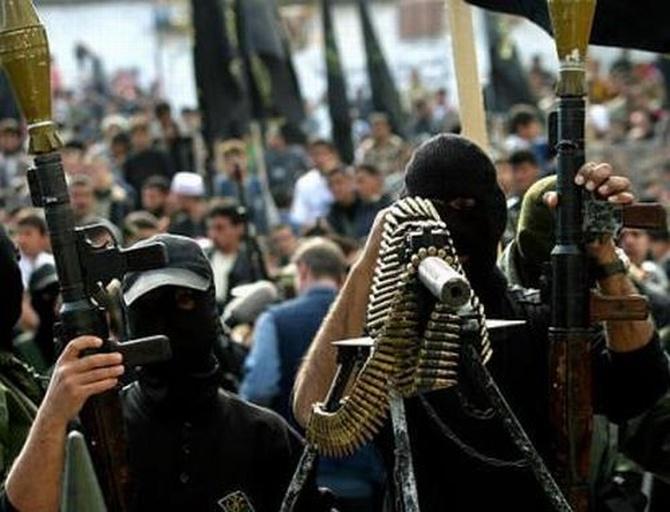 India has said the multiple terror attacks in Paris and Beirut highlight the urgent need to finalise a global convention on terrorism, asserting that the financing being provided to terrorist groups such as ISIS and LeT needs to be addressed collectively.
India has said the multiple terror attacks in Paris and Beirut highlight the urgent need to finalise a global convention on terrorism, asserting that the financing being provided to terrorist groups such as ISIS and LeT needs to be addressed collectively.
"The terrible events of last week, in Beirut and Paris, demonstrate to us that the greatest threat to peace and security comes from violent extremism and religious fanaticism, not from the absence of economic and social development," India's Deputy Permanent Representative to the UN Bhagwant Bishnoi said in the United Nations on Tuesday.
He told the UN Security Council that the terror attacks also highlight the international community's unfinished business in the fight against terrorism.
"Leaders had, in the 2005 Summit, decided that expeditious action would be taken to finalise the Comprehensive Convention on International Terrorism. That has not happened. The price that we pay for procrastination is often in human lives.
"That should not be allowed to continue. Terrorism takes away the foremost of human rights, the right to life. It is truly a crime against humanity," he said at the UNSC session on 'Maintaining of International Peace and Security’.
Bishnoi also underscored the need to address the issue of financing that terrorists obtain saying that ideology alone is not sustaining the terror groups.
"All terrorist organisations - Daesh, or Al Shabaab or Lashkar-e-Tayyaba or Al-Qaeda - have an ideological basis that contradicts the basic tenets of humanity. Ideology alone, however, is not enough to sustain terrorists. They need financing and space to operate. That is, unfortunately, provided to them. And that is what needs to be addressed collectively," he said.
"It is the purveyors of hate and those who characterize others as infidels who are responsible for the violence that threaten our civilizational values. We need to also acknowledge that it is the absence of state authority, or weak state authority, that provides the breeding ground for extremist organizations to operate," he said.
"Terrorism is evil, as is violent extremism. The lack of economic and social development cannot be justification for either. Terrorism has to be eliminated. The events of last week have shown so tragically that there can be no other alternative," he added.
The UNSC held the already scheduled debate on conflict prevention amid added urgency fuelled by last week's terrorist attacks in Beirut and Paris, with UN Secretary-General Ban Ki-moon stressing that counter-terrorism must also tackle such root causes as bad governance, injustice and exclusion.
"Today's violent conflicts and violent extremism are often rooted in a mix of exclusion, inequality, mismanagement of natural resources, corruption, oppression, governance failures, and the frustration and alienation that accompany a lack of jobs and opportunities," Ban said.
"Yet our responses have not caught up to these realities. We are not yet properly integrating United Nations action across the inter-dependent pillars of our work: peace, development and human rights," he added, calling for a global recovery plan for the Middle East similar to the multi-billion dollar Marshall Plan with which the US rebuilt Western Europe after World War II.
Turning to the most recent terrorist attacks in Paris, Beirut and Baghdad, last month's apparent bombing of a Russian plane over Egypt, and the mounting threat from Daesh which controls large swathes of Syria and Iraq, Ban warned against taking reprisals against Muslims.
"No grievance or cause can justify such acts," he said of the terrorist attacks.
But, he added: "I am especially concerned about reprisals or further discrimination against Muslims, in particular Muslim refugees and migrants. This would just exacerbate the alienation on which terrorists feed."
He also referred to the tendency of the Security Council to encroach on the jurisdiction of the General Assembly.
"Just because the three pillars of the United Nations -- namely, peace and security, development and human rights -- are inter-dependent, it does not ipso facto mean that the Security Council must arrogate all these functions to itself."
Describing the Security Council as a non-representative, limited member body with opaque working methods, he said it cannot presume to prescribe policy choices on issues of development and social inclusion to the wider membership of the United Nations.
"The Council will, however, have our full support in its efforts to curb dangerous and extremist trends. The consolidation of political processes and solutions, while also building durable state institutions, will go a long way in addressing extremism and radicalisation. We would encourage the Council to pursue such solutions," he said.







 © 2025
© 2025